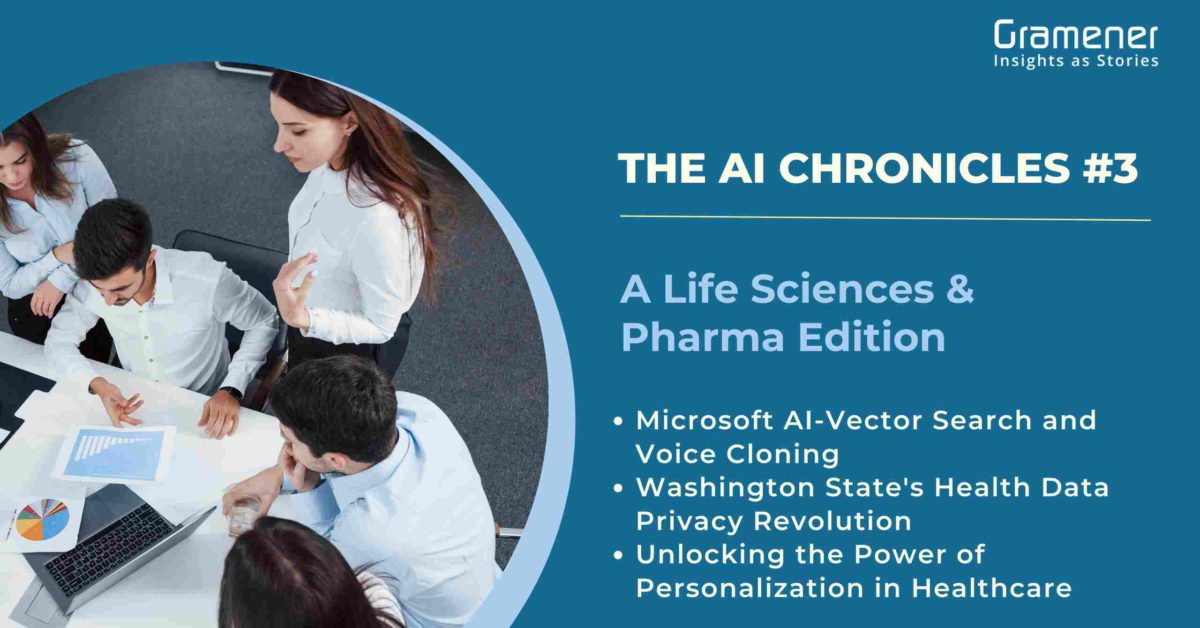Welcome back to the AI Chronicles Series! Don’t forget to explore the other three episodes of the series.
- The AI Chronicles #1 – What’s hot in the pharma world with Generative AI, how to build robust patient data privacy, and what’s up with Apple’s AI-powered health coach.
- The AI Chronicles #2 – McKinsey’s 5-step digital transformation for Pharma companies, Sanofi’s AI approach to employee productivity, and more on digitization of medical data.
- The AI Chronicles #4 – AI Chronicles #4: AWS HealthScribe revolutionizes clinical documentation, Roche’s report underscores digital tech and data management, and Pytrial aids clinical trials with Generative AI.
In the 3rd article of the AI Chronicles series, we talk about Microsoft’s two new AI-powered features for healthcare and pharmaceutical organizations: vector search and voice cloning. These new features have the potential to improve the accuracy and efficiency of image and video analysis in healthcare, as well as enable personalized virtual assistants for patients and healthcare professionals. We also explore Washington’s health data privacy revolution and the growing importance of personalization in healthcare.
Table of Contents
Microsoft Launches Vector Search in Preview, Voice Cloning in General Availability
What is it About?
Microsoft has announced the launch of Vector Search in preview and the general availability of voice cloning in Microsoft Teams. Vector Search is a new AI-powered search feature that allows users to search for content within images and videos, and voice cloning enables users to create and customize their own AI-powered voice assistants.
What Does it Mean?
For healthcare and pharmaceutical organizations, the launch of Vector Search and voice cloning in Microsoft Teams could have significant implications. Vector Search could improve the accuracy and efficiency of image and video analysis in healthcare, while voice cloning could enable personalized virtual assistants for patients and healthcare professionals. Additionally, these features could also be used to improve the accessibility of healthcare services for individuals with disabilities or limited mobility.
Washington’s Health Data Privacy Revolution
What is it About?
Washington State’s new health data privacy law gives patients the right to access, control, and delete their own health data. The law, known as the “My Health, My Data” initiative, aims to empower patients and give them more control over their personal health information.
What Does it Mean?
For healthcare and pharmaceutical organizations, this law could have significant implications for how they collect, store, and use patient health data. Healthcare providers will need to be more transparent about how they handle patient data and give patients more control over their personal information. This could lead to increased patient trust and better health outcomes, as patients will be more likely to share their health data with healthcare providers who are transparent and accountable. Additionally, this law could also set a precedent for other states to follow, leading to a national shift in health data privacy laws. The law’s emphasis on patient-directed data sharing has the potential to facilitate more efficient and effective data-driven research and innovation in the healthcare industry, ultimately leading to better patient outcomes and improved public health.
Unlocking the Power of Personalization in Healthcare
What is it About?
In this McKinsey article, the concept of personalization in healthcare is explored. Personalization can be defined as the tailoring of healthcare services to the unique needs and preferences of each individual patient. This approach is made possible by advances in data analytics, artificial intelligence, and other technologies that enable healthcare providers to collect and analyze vast amounts of data about their patients.
What Does it Mean?
The article highlights the importance of personalization in improving patient outcomes and satisfaction. By leveraging data and technology, healthcare providers can better understand their patients’ needs and preferences and deliver more effective and efficient care. Personalization can also help healthcare providers differentiate themselves in a competitive market and improve their financial performance. However, the article also notes that personalization in healthcare is not without its challenges, such as ensuring data privacy and security, and addressing disparities in access to personalized care. Overall, this article provides valuable insights into the potential benefits and limitations of personalization in healthcare.
The Gramener Take
At Gramener, we are committed to revolutionizing the healthcare industry through innovative data intelligence solutions. We understand the importance of data-driven insights, machine learning, and AI in transforming pharmaceutical and medical device firms. Our solutions empower these companies to navigate complex datasets, make informed decisions, and develop personalized treatment options.
We recognize the potential of vector search and voice technologies in healthcare, in improving HCP engagement, streamlining workflows, and enhancing the overall HCP experience. By incorporating voice-based search and AI-driven voice cloning, healthcare companies can leverage advanced technologies to provide better care and outcomes.
We acknowledge the growing need for robust data privacy and security measures in the healthcare industry. At Gramener, we emphasize the importance of building trust with customers and ensuring the protection of sensitive health information. Our data-centric data privacy and security solutions such as AInonymize enable companies to maintain compliance with data privacy regulations while facilitating secure data sharing and collaboration between stakeholders.

